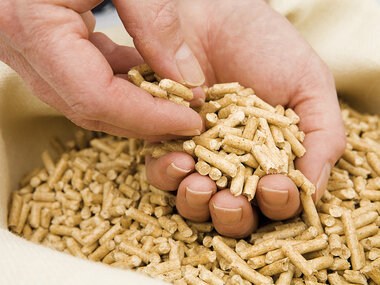MM TIMBER LOG: High-quality pellets are an environmental friendly fuel
Rudolf Angeringer on the role of pellets as a biomass fuel, the ENplus®A1 quality certificate and the contribution of pellet heating systems to the fight against climate change.
What's Mayr-Melnhof Holz’ pellet production capacity?
Mayr-Melnhof Holz produces certified and quality-controlled pellets at all of its three sawmill sites in Leoben (AT), Paskov (CZ) and Efimovskij (RU). Our intended production volume for 2021 is roughly 300,000 tons of pellets, exclusively at ENplus®A1 for use in private and commercial applications.
What do pellets contribute to the fight against climate change?
When wood is processed, up to 40 percent of the input is in the form of sawdust or shavings and wood chips, just the right raw material for the production of pellets. Thus, none of this valuable raw material that is wood is wasted, but added value is created, making a significant contribution to supporting the European transition from fossil fuels, which are responsible for high CO2 emissions, to exclusively renewable energy sources. Needless to say that Mayr-Melnhof Holz only processes wood from sustainably managed forests that are PEFC certified or meet similar standards recognised by the PEFC. This way, we promote socially and environmentally compatible forest management and guarantee natural, ecological wood products.
Why did Mayr-Melnhof Holz opt for ENplus® certification?
We have been a member of the Austrian Pellet Association from the get-go (proPellets Austria). Together with our colleagues from the Association we have campaigned for the introduction of a uniform certification standard to clearly define pellets quality. This gives our customers the peace of mind to only use pellets of exceptional quality.
What effects does the certification system have on the pellets market?
The ENplus®A1 certification system defines clear guidelines for producing companies, retailers and delivery services. All market participants meet the same requirements meaning that the end users can rest assured to receive a product of high quality. The uniform standard is also a clear advantage for the producers of boilers and pellets ovens. They can now adapt their heating systems to a clearly defined quality.
What are the biggest challenges a pellets producer faces that wants to supply end users with a premium ecologically friendly product?
The basic prerequisite for the production of high-quality pellets is the use of the right raw material. Since we use our own sawmill by-products - fresh sawdust or wood shavings – we know exactly the origin and quality of the raw material for pellet production. Highly automated production facilities with extensive quality controls, as well as specially designed storage silos are another essential point to ensure a high quality pellet. The reliable availability of pellets through our own raw material supply gives our trading partners the possibility to supply their customers well at any time.
Will people in Europe discover the benefits of quality pellets and change the way they heat?
Many consumers already trust high-quality pellets, but some only after bad experiences with non-certified pellets. We still have some work to do in making people aware. However, it is undisputed that we must protect our environment for ourselves and the next generations and put a stop to climate change. Pellet heating systems, operated with certified pellets, make a significant contribution to this.
Why are some still hesitant about switching to pellet heating? What would you say to these people?
Converting a heating system is sometimes quite expensive. In countries where the government provides subsidies for the switch, the energy transition advances more quickly. We hope that many more countries will discover the benefits of biomass use for our climate and environment and help people replace fossil fuel heating systems with heating systems powered by renewable energy.
Also, the argument that burning pellets pollutes the air is still widespread. This argument is definitely not justified, because modern pellet heating systems operate almost emission-free. We would like to recommend to critics to visit the website of their national pellets association or www.enplus-pellets.eu. There they will find reliable information on wood pellets for end users.
This interview was originally published on 20 May 2021 in ENplus®. To the Report
Your media relations contact person
CONTACT





